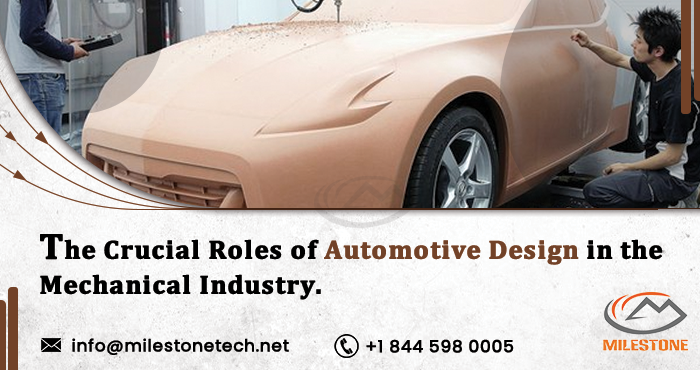The Crucial Roles of Automotive Design in Mechanical Industry
The world of engineering and mechanical services is continually evolving, with technological advancements reshaping the industry at an unprecedented pace. Amid these changes, the role of automotive design in the mechanical sector has become increasingly crucial. This blog will delve into the various facets of how automotive design plays a pivotal role in the mechanical industry, particularly in the context of engineering services.

[edit] Innovative Design and Engineering Integration
The automotive industry has long been at the forefront of innovation in design and engineering. The principles and practices that have evolved in the automotive sector are directly applicable to other mechanical industries. In the field of engineering services, for instance, the integration of automotive design concepts can result in more efficient and creative solutions. The modular design approach used in automotive design, where components are designed to be easily assembled or replaced, can be leveraged in mechanical engineering to streamline manufacturing processes.
[edit] Advanced Materials and Manufacturing Techniques
Automotive design often pushes the boundaries of materials science and manufacturing techniques. Lightweight materials like carbon fibre, advanced composites, and high-strength alloys are extensively used in the automotive sector to improve fuel efficiency and safety. These innovations can be adapted to the mechanical industry, resulting in more durable and lightweight products. In the context of engineering services, this translates into cost-effective and sustainable solutions.
[edit] Safety and Reliability
Safety is a paramount concern in both the automotive and mechanical industries. The stringent safety standards applied in automotive design, including crash tests and extensive simulations, can be adopted in the engineering sector to ensure the safety and reliability of mechanical systems. This cross-pollination of ideas contributes to the development of robust and secure mechanical solutions.
[edit] Digital Twin Technology
Digital twin technology, which involves creating a digital replica of a physical system, is a concept that has gained significant traction in the automotive sector. The same technology is incredibly valuable in the field of engineering services. By creating digital twins of mechanical systems, engineers can simulate and analyse performance, identify potential issues, and optimise designs before the physical product is built. This approach not only reduces development costs but also speeds up the design process.
[edit] Environmental Sustainability
Sustainability is a growing concern across industries. Automotive design has seen an increased focus on electric and hybrid vehicles, as well as alternative fuels and energy-efficient systems. These innovations can be adapted to the mechanical sector to develop environmentally friendly solutions. In engineering services, this translates into designing more energy-efficient HVAC systems, sustainable building materials, and water conservation methods.
[edit] AI and Machine Learning
Artificial intelligence and machine learning have transformed the automotive industry, enabling self-driving cars, predictive maintenance, and advanced driver assistance systems. These AI tools have the potential to revolutionise the mechanical industry as well. In engineering services, AI-driven predictive maintenance can ensure the longevity and reliability of mechanical systems. AI can also be used for predictive analytics in building management, improving energy efficiency and occupant comfort.
[edit] 3D Printing and Prototyping
3D printing has been a game-changer in automotive design, allowing for rapid prototyping and iteration. In the mechanical industry, 3D printing can be used to create custom components and prototypes, reducing lead times and costs. Engineering services can benefit from this technology by quickly producing scale models for project presentations and testing.
[edit] Cross-Industry Collaboration
Collaboration between the automotive and mechanical industries fosters innovation. Engineers and designers from both sectors can exchange ideas and best practices, leading to cross-fertilization of knowledge. In engineering services, this collaborative approach can result in out-of-the-box solutions that combine the best of both worlds.
In conclusion, automotive design plays a pivotal role in the mechanical industry, offering innovative solutions, advanced materials, safety practices, digital twin technology, sustainability, AI tools, 3D printing, and collaboration opportunities. As technology continues to advance, the synergy between these two industries will become even more pronounced. Engineering services can greatly benefit from adopting and adapting the principles and practices of automotive design, creating a brighter and more efficient future for the mechanical industry.
--Engineering Design & BIM Services
[edit] Related articles on Designing Buildings
Featured articles and news
UKCW London to tackle sector’s most pressing issues
AI and skills development, ecology and the environment, policy and planning and more.
Managing building safety risks
Across an existing residential portfolio; a client's perspective.
ECA support for Gate Safe’s Safe School Gates Campaign.
Core construction skills explained
Preparing for a career in construction.
Retrofitting for resilience with the Leicester Resilience Hub
Community-serving facilities, enhanced as support and essential services for climate-related disruptions.
Some of the articles relating to water, here to browse. Any missing?
Recognisable Gothic characters, designed to dramatically spout water away from buildings.
A case study and a warning to would-be developers
Creating four dwellings... after half a century of doing this job, why, oh why, is it so difficult?
Reform of the fire engineering profession
Fire Engineers Advisory Panel: Authoritative Statement, reactions and next steps.
Restoration and renewal of the Palace of Westminster
A complex project of cultural significance from full decant to EMI, opportunities and a potential a way forward.
Apprenticeships and the responsibility we share
Perspectives from the CIOB President as National Apprentice Week comes to a close.
The first line of defence against rain, wind and snow.
Building Safety recap January, 2026
What we missed at the end of last year, and at the start of this...
National Apprenticeship Week 2026, 9-15 Feb
Shining a light on the positive impacts for businesses, their apprentices and the wider economy alike.
Applications and benefits of acoustic flooring
From commercial to retail.
From solid to sprung and ribbed to raised.
Strengthening industry collaboration in Hong Kong
Hong Kong Institute of Construction and The Chartered Institute of Building sign Memorandum of Understanding.
A detailed description from the experts at Cornish Lime.
























